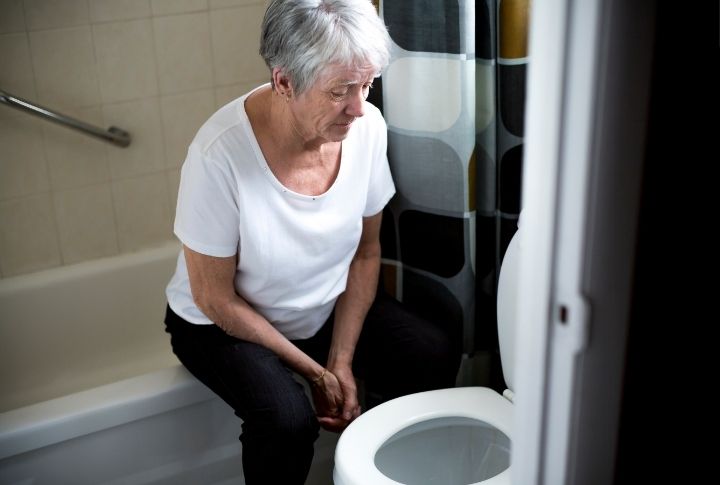
As you transition into your 60s, your body undergoes inevitable changes that are both cultural milestones and biological realities. However, some of these signs of aging likely made their cameos in the preceding decade. The occasional gray hair, weight gain, and laugh lines foreshadowed more was to come. But just as you adjust to those 40-something realities, a whole new stage of biological changes gets ushered in with every passing birthday into your 60s. So read on to discover ten common changes you should expect at this chapter of your life and the healthy steps you can take to delay or lessen their impact.
Teeth and Gum Changes

Brace yourself because those pearly white teeth might not stay as bright for long. From tooth decay to gum disease to mouth dryness, our 60s mean being extra vigilant about oral health. Years of wear and tear and changing saliva production can make your chompers vulnerable. So, bid farewell to lazy hygiene habits—brushing, flossing, and dental visits need to become religious practices during this transition.
Weaker Bones

You had better watch your steps as you age because your bones are more prone to fractures. Age brings a steady loss of bone density and strength, especially for women in their post-menopausal years. Reduced calcium absorption meets depleted estrogen levels, a perfect storm for making bones brittle. Weight-bearing exercise helps, but discussing bone density scans with your doctor is wise.
Urinary Incontinence

That desperate sprint to the bathroom? Sadly, it gets more common once you’ve crossed into your 60s. Incontinence issues start becoming unexpected party guests. Culprits include weakened pelvic muscles, an enlarged prostate, or nerve damage. While embarrassing, many treatments, from kegel exercises to medications, can help put a cork in those leaks.
Heart Troubles

Your trusty heart may start throwing you more curveballs. Years of unhealthy habits finally begin to catch up, increasing cardiac risks as we age. Smoking, poor diet, inactivity, and conditions like high cholesterol take their toll. And don’t ignore subtle symptoms like fatigue or breathlessness—get that chest pain checked out, stat!
Memory Loss

“Now, where did I put those keys?” Mild bouts of forgetfulness are just part of the program once you’re a 60s member. However, repeatedly struggling to recall words and names could indicate more concerning cognitive decline. Don’t ignore chronic memory troubles. See a doctor to rule out conditions like Alzheimer’s. In the meantime, keep your mind sharp through social engagement and brain games.
Immunity Decreases

You’ll notice that your immunity suddenly wanes as you progress into your 60s. Suddenly, your body can combat that cold as quickly as it used to. You can thank your aging immune system for being more susceptible to bugs and prolonged illnesses. Our bodies’ frontline defenses against viruses and bacteria get slightly tired as we age. Support your immune troops through a nutritious diet, ample sleep, and stress management.
Blood Pressure Rises

The numbers don’t lie—keeping your blood pressure in a healthy range is an uphill battle starting in your 60s. Artery stiffness from plaque buildup and decreased elasticity contribute to risky spikes. However, high BP often has no symptoms, so regular checks are crucial. Lifestyle adjustments to diet, exercise, weight, and stress management can help keep those numbers in check.
Sleep Troubles

Fragmented sleep becomes the norm for many in their 60s due to changing sleep patterns and other factors. 6 to 8 hours of sleep might become a figment of the past as tossing and turning becomes the norm. You may wake up repeatedly or battle anxious thoughts that disrupt your slumber. Establish a calming pre-bed routine without stimulants like alcohol. And invest in accessories like blackout curtains or sound machines for optimal rest.
Mental Health Issues

As you age, life transitions, grief, isolation, and chronic health stresses can affect your mental and emotional health. Rates of depression and anxiety escalate after age 60. To stay psychologically resilient, prioritize moving your body regularly through exercise for mood-boosting endorphins. Challenge your brain by learning new skills. Lean on your support system, and don’t isolate yourself socially. And seek counseling if you experience persistent sadness, worry, anger, or loss of motivation.
Increased Chances of a Critical Fall

Around 1 in 4 Americans over age 65 suffer a debilitating fall each year, which can lead to injuries like fractures or brain trauma. This is because balance and stamina decline with age. Taking a proactive stance on fall prevention in your 60s is wise. First, thoroughly safety-proof your home by securing loose rugs, improving lighting, adding bathroom grab bars, and ensuring stairs have handrails. Finally, have your healthcare provider assess and manage balance issues, vision problems, or medications that could increase your fall risk.

Comments
Loading…